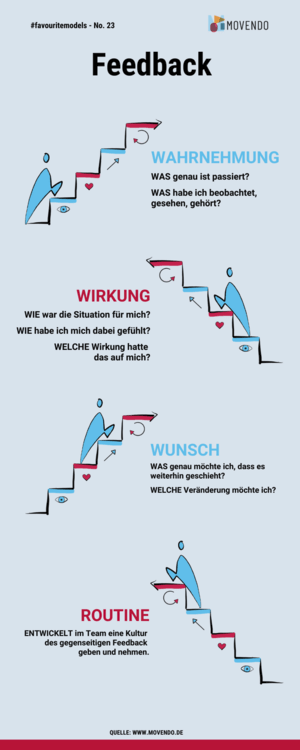Created by Katrin Aust
#favouritemodel No. 23 – Feedback

If you ask employees what they miss most in their day-to-day work, the most common answer is honest feedback. For a manager, giving feedback to employees is both a “superpower” and a “superduty” at the same time. As a manager, I have the opportunity to express my appreciation and recognition to the employee and to support him or her in changing and learning something. Feedback basically refers to observed behavior that I find good and helpful and therefore want to give positive feedback, as well as to observed behavior that I find obstructive or inappropriate and therefore want to give the other person the opportunity to change it.
The principles for feedback are that:
- I want to give the other person an opportunity to develop further
- I have a positive intention here and
- also assume that the other person is acting in good faith.
Basically, it is helpful if the entire team represents a feedback culture in which everyone gives and receives feedback from each other. And this as soon as I have observed a behavior that I would like to report back (not just once or twice a year, at the so-called annual review).
If I want to provide feedback on an observed behavior, the following process is worthwhile:
Perception
What exactly happened? What did I observe, see, hear?
I describe the situation in my mind’s eye to the other person as precisely as possible so that they can understand what the feedback relates to.
Effect
What was the situation like for me? How did it make me feel? What impact did the behavior have on me?
If I’m annoyed about something, I say the same thing; if I thought something was great, I say the same thing.
Wish
What exactly would I like you to do again (positive feedback) or change (constructive feedback)?
Here I formulate what I wish for.
This wish, as well as my previous observations, are subjective and represent nothing more but also nothing less than my personal perception and opinion. And it is very likely that this is exactly what employees want from their managers: individual feedback on their performance and the synchronization of goals and expectations.
Accepting feedback is just as essential as giving feedback. It is worth simply listening to the person giving feedback and resisting the impulse to spontaneously justify or explain yourself. This also applies to both positive and constructive feedback.

How does my #favoritemodel help you?
It pays to establish a feedback culture with your team. When “face-saving” feedback becomes the norm, it is much easier to talk to each other instead of about each other. This is essential for an atmosphere of trust and promotes motivation, while also allowing you to focus on the actual tasks at hand.
As a manager, make it a habit to give feedback for “purely positive” reasons and not simply express praise by remaining silent. It is also a “superpower” to regularly ask your employees for feedback and thus invite them to help shape your own development.
Author

Katrin Aust
Consultant




